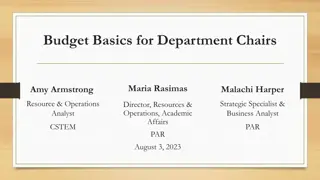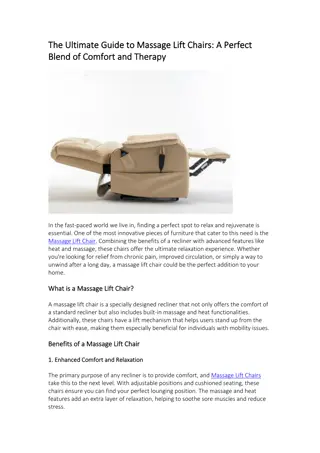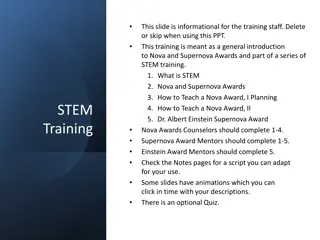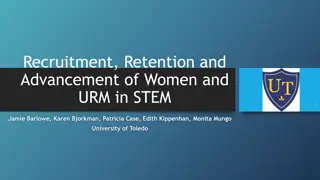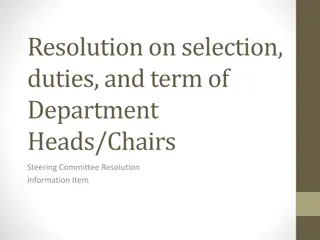Effective Strategies for STEM Department Chairs
Highly effective STEM department chairs exhibit seven key habits, including developing good people skills, being a fair decision-maker, utilizing communication effectively, advocating for their discipline, leading collaboratively, understanding administrative functions, and reflecting for ongoing improvement. Successful chairs prioritize caring for their team, fostering collaborative change, and strategic planning. Continuous reflection and action are essential for driving progress in STEM education leadership.
Download Presentation

Please find below an Image/Link to download the presentation.
The content on the website is provided AS IS for your information and personal use only. It may not be sold, licensed, or shared on other websites without obtaining consent from the author.If you encounter any issues during the download, it is possible that the publisher has removed the file from their server.
You are allowed to download the files provided on this website for personal or commercial use, subject to the condition that they are used lawfully. All files are the property of their respective owners.
The content on the website is provided AS IS for your information and personal use only. It may not be sold, licensed, or shared on other websites without obtaining consent from the author.
E N D
Presentation Transcript
Seven Habits of Highly Effective STEM Department Chairs ASCN April 22, 2020 Bob Hilborn, Associate Executive Officer American Association of Physics Teachers David Craig, Associate Department Head Department of Physics, Oregon State University & Co-Chair, EP3 Project
Link to complete 7 Habits document: Link to complete 7 Habits document: bit.ly/3czzLtT
The 7 Habits A highly effective STEM department chair... Habit 1:Develops good people skills. Habit 2: Is a good decision maker and fair negotiator. Habit 3: Develops and utilizes communication skills. Habit 4: Is a strong advocate for the discipline and education in the discipline. Habit 5: Serves as a skilled organizer and a leader who fosters collaborative change. Habit 6: Is knowledgeable about administrative functions and procedures. Habit 7: Reflects, Assesses and Plans.
People Skills and Caring People Skills and Caring stories Habit 1:Develops good people skills. A good department chair cares about the people who work in the department and who the department serves. The chair has sound emotional intelligence, is a good listener, and serves as a mentor and role model for both faculty and students. The chair appreciates and publicly recognizes talent and hard work and knows when to park their ego. An effective chair cares about and is attentive to matters of equity, diversity, and inclusion in all aspects of the department s operation. stories Habit 5: Serves as a skilled organizer and a leader who fosters collaborative change. An effective chair is as much a leader as an administrator or supervisor. The chair is good at working with faculty and administrators to develop and implement a shared vision for the discipline at the college or university and seeks ways to help faculty members find their place in the department, work together, and contribute their best to the department s efforts.
Reflect, Assess, Plan Reflect, Assess, Plan stories stories Habit 7: Reflects, Assesses and Plans. An effective chair has a clear sense of the potential and future of the department, understands its mission and vision, and can think and plan on both short and long time scales. The chair reflects on the current state of the department and its programs, encourages the assessment of the effectiveness of those programs, uses data and information to drive decision-making, and leads the department in strategic planning consistent with its mission and vision.
Continuous Reflection & Action Continuous Reflection & Action Question yourself What are the conditions we face? (Context, constraints, and resources) Who are we? Who do we serve? (Identity, mission, values) What and where do we want to be? (Vision, strategic plan) Don t stop asking these questions (Cyclic and continuous Reflection & Action)
Continuous Reflection & Action Continuous Reflection & Action Successful transformation involves constant, purposeful questioning. Ask questions. Gather information. Rally support and resources. Plan and do things. See how they work out. Repeat. And never, ever forget the people involved.
Manage Up and Manage Down Manage Up and Manage Down stories Habit 4: Is a strong advocate for the discipline and education in the discipline. The chair can clearly articulate the value of and effectively advocate for the discipline with the institution s leadership, with other department chairs, with students, and with external audiences. Habit 6: Is knowledgeable about administrative functions and procedures. The chair understands budgets and accounts, knows how to find and manage resources, and is knowledgeable about university procedures. The chair works effectively with higher level administrators as well as with departmental faculty and staff. The chair develops and demonstrates excellent time management skills, the ability to multitask, and knows when to delegate. stories
Breakout Groups Breakout Groups [10 [10- -12 minutes] 12 minutes] Discussion prompts: 1.New and soon-to-be chairs What do I wish I had known before becoming (or agreeing to become) a chair? (Experienced chairs are welcome to join this group as well.) 2.Building a shared vision of the department s future How can the chair rally faculty interest in enhancing the department s undergraduate educational program, or otherwise encourage recalcitrant faculty to participate in the department s mission? 3.Managing up What are productive ways of interacting with Deans and Provosts (and occasionally Presidents)? 4.Being a leader in a time of crisisWhat is the chair s role in responding to a crisis situation? How does the chair help the department not lose sight of long-term strategic plans?
Discussion, Questions & Answers Discussion, Questions & Answers
Further Resources Further Resources Effective Practices for Physics Programs - EP3guide.org Hilborn et al. (2003) Strategic Programs for Innovations in Undergraduate Physics (SPIN-UP): Project Report https://www.aps.org/programs/education/undergrad/faculty/spinup/ spinup-report.cfm Heron et al. (2016) Phys21: Preparing Physics Students for 21st- Century Careers https://www.aps.org/programs/education/undergrad/jtupp.cfm
Habit 1:Develops good people skills. A good department chair cares about the people who work in the department and who the department serves. The chair has sound emotional intelligence, is a good listener, and serves as a mentor and role model for both faculty and students. The chair appreciates and publicly recognizes talent and hard work and knows when to park their ego. An effective chair cares about and is attentive to matters of equity, diversity, and inclusion in all aspects of the department s operation.
Habit 2: Is a good decision maker and fair negotiator. An effective chair seeks broad input and builds consensus where possible, but is decisive when necessary and makes timely decisions backed with sound reasoning and solid information. The chair knows that not all requests can be granted and is good at resolving disagreements. The chair is known for good judgement and being fair. The chair understands the difference between equality and equity, and uses problem-solving skills to mediate conflicts.
Habit 3: Develops and utilizes communication skills. An effective chair learns how and when to communicate with faculty, administrators, students, alumni, and potential partners and benefactors, and has a keen sense of their intended audience. The chair understands and can articulate how the department s academic specialties work, both in education and research, and is knowledgeable about the context in which the discipline is done.
Habit 4: Is a strong advocate for the discipline and education in the discipline. The chair can clearly articulate the value of and effectively advocate for the discipline with the institution s leadership, with other department chairs, with students, and with external audiences.
Habit 5: Serves as a skilled organizer and a leader who fosters collaborative change. An effective chair is as much a leader as an administrator or supervisor. The chair is good at working with faculty and administrators to develop and implement a shared vision for the discipline at the college or university and seeks ways to help faculty members find their place in the department, work together, and contribute their best to the department s efforts.
Habit 6: Is knowledgeable about administrative functions and procedures. The chair understands budgets and accounts, knows how to find and manage resources, and is knowledgeable about university procedures. The chair works effectively with higher level administrators as well as with departmental faculty and staff. The chair develops and demonstrates excellent time management skills, the ability to multitask, and knows when to delegate.
Habit 7: Reflects, Assesses and Plans. An effective chair has a clear sense of the potential and future of the department, understands its mission and vision, and can think and plan on both short and long time scales. The chair reflects on the current state of the department and its programs, encourages the assessment of the effectiveness of those programs, uses data and information to drive decision-making, and leads the department in strategic planning consistent with its mission and vision.




